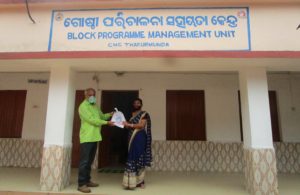Community vigilance streamlines Health related Entitlements in Bhakurguda
During a community monitoring process conducted recently in Bhakurguda village of Rayagada block, twofold concerns came to light. Firstly, the Aaganwadi Centre environment was filthy and unhygienic which obviously can affect the health of young children who visit the centre. Secondly, a defunct bore-well was noticed in the campus, which apparently was dug up for a long time that put the AWW difficult in fetching clean and drinking water on a regular basis.
Bhakurguda village falls under Rayagada block of Rayagada district. There are a total of 113 beneficiaries in the village, with 7 pregnant women, 10 lactating mothers, 20 adolescent girls, 38 children falling under the age group of 6 months to 3 years and 38 children under the age group of 3 years to 6 years.
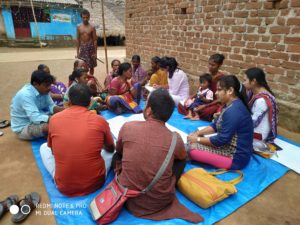 As part of the community monitoring of basic health services, facilitated by CYSD, both service providers i.e. ASHA, AWW and service users, like pregnant women and lactating mothers were interacted with, exclusively. The issue was dealt in great detail and it was observed that due to defunct bore-well within the Anganwadi premises, the Anganwadi workers were forced to travel distances to collect water for drinking and cooking purposes. On the other hand, the Anganwadi Centre has 38 pre-school children and it is a tedious task to collect sufficient water for cooking and drinking for all these children. Even the beneficiaries i.e. mothers of pre-school children complain of the unavailability of drinking water at the AWC. Secondly, the surrounding campus of the Centre remained unhygienic was leading to insect breeding and thus exposing children to diseases. This resulted in absenteeism of children at the AWC.
As part of the community monitoring of basic health services, facilitated by CYSD, both service providers i.e. ASHA, AWW and service users, like pregnant women and lactating mothers were interacted with, exclusively. The issue was dealt in great detail and it was observed that due to defunct bore-well within the Anganwadi premises, the Anganwadi workers were forced to travel distances to collect water for drinking and cooking purposes. On the other hand, the Anganwadi Centre has 38 pre-school children and it is a tedious task to collect sufficient water for cooking and drinking for all these children. Even the beneficiaries i.e. mothers of pre-school children complain of the unavailability of drinking water at the AWC. Secondly, the surrounding campus of the Centre remained unhygienic was leading to insect breeding and thus exposing children to diseases. This resulted in absenteeism of children at the AWC.
With this backdrop, a village level intervention was staged where the service providers and service users participated. The issues were taken as top priorities by both service provider and service user and a possible plan of action was formulated. In an action mode, the mothers’ committee took up the responsibility to clean the surrounding of Aaganwadi Centre on every VHND. Similarly, for clean and drinking watersupply to the AWC, it was decided to bring the issue to the notice of the Sarapanch. The responsibility of writing an application was taken up by 10 mothers and they were assisted by one of the community resource persons of CYSD.
During the follow up process, it was found out that the Adolescent Club and 10 mothers together have submitted the proposed application to the Sarapanch. As a result, all the bore-wells inside the village including the AWC have already been repaired by a self-employed mechanic of the nearby village. The mechanic was also supported and assisted by the youth club members, adolescent club members, mothers of pre-school children and ward member. As a result, clean and regular drinking water is made available at the Aaganwadi Centre and cleaning of the Aaganwadi Centre has been taken up as a regular activity by the Mothers’ Committee.
Streamlining of health related entitlements in Bhakurguda was possible due to community vigilance and regular monitoring of the facilities created for the common people.

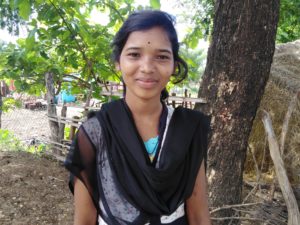 During this lock down and closure of schools, Dasmotivolunteered to support the children of her village byimparting educationkeeping in mind the COVID-19 related advisories. Looking at her interest, CYSD programme team guided her to conduct the classes with innovative methods for easy learning of children. She followed indoor creative learning process to develop the cognitive knowledge level of children. For her volunteering work, shewas supported with remuneration fromthe project. Dasmoti decided to do cultivation of their small farm land, with her hard earned money. She hired a tractor for ploughing the field and bought paddy seed to sow with the saved money.
During this lock down and closure of schools, Dasmotivolunteered to support the children of her village byimparting educationkeeping in mind the COVID-19 related advisories. Looking at her interest, CYSD programme team guided her to conduct the classes with innovative methods for easy learning of children. She followed indoor creative learning process to develop the cognitive knowledge level of children. For her volunteering work, shewas supported with remuneration fromthe project. Dasmoti decided to do cultivation of their small farm land, with her hard earned money. She hired a tractor for ploughing the field and bought paddy seed to sow with the saved money.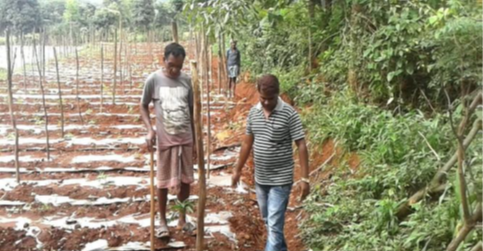 With the help of family members, he made a boundary fencing of the land and planted the mango saplings as long term investment. Being a job cardholder, he applied for work under MGNREGS and using the labour payment he showed some vegetable, ginger and turmeric seeds for seasonal intercropping in the mango plantation field for livelihood.
With the help of family members, he made a boundary fencing of the land and planted the mango saplings as long term investment. Being a job cardholder, he applied for work under MGNREGS and using the labour payment he showed some vegetable, ginger and turmeric seeds for seasonal intercropping in the mango plantation field for livelihood.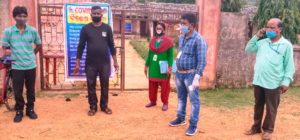 As per a recently conducted baseline survey by the CYSD Community Health Volunteers, 49% of the total population are farmers (depends on monsoon), 26% are daily laborers and others are migrant labourers. Thus agricultural activity alone does not support the tribal families for round the year and they look for alternative opportunities of earning livelihood. The region is gripped under poverty, illiteracy and underdevelopment. This grim situation compels the tribal population to migrate to urbans in search of employment and for survival. The study team further explored to know about causes of migration, impact of migration and the difficulties faced during the migration from the migrant workers of Thakurmunda block, who were detained in Temporary Medical Center (TMC) for quarantine after returning from Gujarat.
As per a recently conducted baseline survey by the CYSD Community Health Volunteers, 49% of the total population are farmers (depends on monsoon), 26% are daily laborers and others are migrant labourers. Thus agricultural activity alone does not support the tribal families for round the year and they look for alternative opportunities of earning livelihood. The region is gripped under poverty, illiteracy and underdevelopment. This grim situation compels the tribal population to migrate to urbans in search of employment and for survival. The study team further explored to know about causes of migration, impact of migration and the difficulties faced during the migration from the migrant workers of Thakurmunda block, who were detained in Temporary Medical Center (TMC) for quarantine after returning from Gujarat.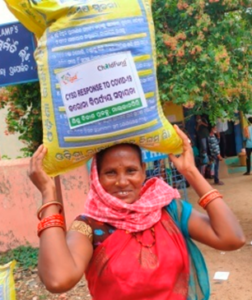 Malkanagiri being the operational district, CYSD team had taken notice of the issue and planned to extend necessary input support to the vulnerable farmers to initiate Kharif crop cultivation getting out of the jeopardy of Corona. To materialize it, the team initiated negotiations with the M/s LAMPCS to help the farmers avail seed support at a subsidized rate. The organization anticipated that the proposal would benefit a total of two hundred and forty (240) farmers of sponsored households in terms of paddy seed and technical support.
Malkanagiri being the operational district, CYSD team had taken notice of the issue and planned to extend necessary input support to the vulnerable farmers to initiate Kharif crop cultivation getting out of the jeopardy of Corona. To materialize it, the team initiated negotiations with the M/s LAMPCS to help the farmers avail seed support at a subsidized rate. The organization anticipated that the proposal would benefit a total of two hundred and forty (240) farmers of sponsored households in terms of paddy seed and technical support.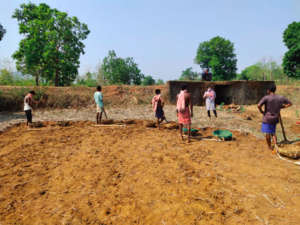 Being inspired by the GP functionaries and the volunteers of CYSD, Biswanath put job demand in his Panchayat office and was called to join the earthwork for construction of village road under MGNERGS. Getting engagement as daily labourer @207 per day, Biswanath was bit ashamed while comparing his past income against the existing job available nearer by his community.
Being inspired by the GP functionaries and the volunteers of CYSD, Biswanath put job demand in his Panchayat office and was called to join the earthwork for construction of village road under MGNERGS. Getting engagement as daily labourer @207 per day, Biswanath was bit ashamed while comparing his past income against the existing job available nearer by his community.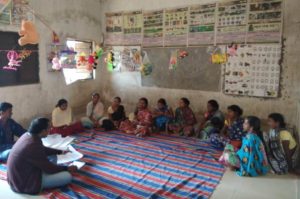 Maliguda Anganwadi Center is coming under Kollar Panchayat of Boipariguda block of Koraput district which serves 73 beneficiaries. Of the 73 beneficiaries, there are 20 children ageing 6 months to 3 years, 20 children between the age group of 3 to 6 years, 25 adolescent girls, 4 pregnant women and 4 lactating mothers.
Maliguda Anganwadi Center is coming under Kollar Panchayat of Boipariguda block of Koraput district which serves 73 beneficiaries. Of the 73 beneficiaries, there are 20 children ageing 6 months to 3 years, 20 children between the age group of 3 to 6 years, 25 adolescent girls, 4 pregnant women and 4 lactating mothers.